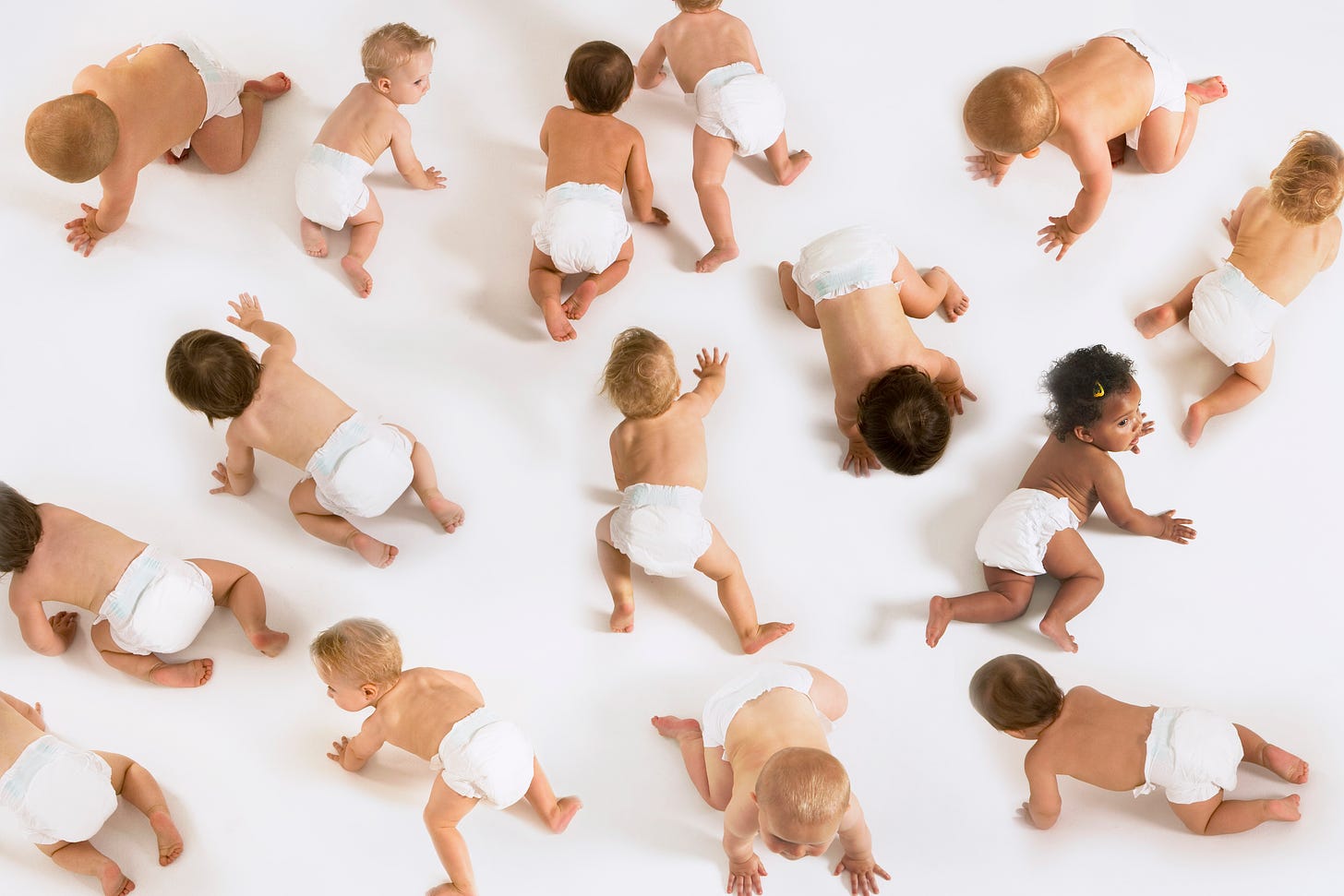I'm Pro-Natalist But Don't Get the Moral Case for Pro-Natalism
not to be crude, but aren't they arguments for just fucking all the time?
I’m 40 and childless, and I think that there are many unfair ways in which our culture continues to treat childless adults as worthless, ways both grand and subtle. Many people you meet will talk as if a life that does not end in childrearing is somehow not worth living. I’m also perpetually depressed by the obsession with youth in our culture, as most people spend considerably more time as adults than as children, meaning we’re setting things up for more unhappy years than happy. Finally, I really hate the way that the population-size debate seems stuck between two absurd caricatures - either you’re stockpiling canned goods because you think overpopulation will destroy us all, or you think any concerns about overpopulation are inherently and immediately racist and you pretend that there’s no such thing as a resource constraint. (If only we could have balance!)
Despite all of that, though, I’m firmly in favor of pro-natalist policies, on pretty standard-issue redistributive grounds. The drive to have children is hardwired into our DNA, which is convenient because children are necessary for the survival of the species, as well as to prevent things like Japan’s population-related economic problems. Having kids is also expensive and hard. If we acknowledge that people will always have babies, and that doing so puts many people into deep economic strife, I think it’s appropriate to take the money rich people were going to spend on their third Bugatti and use it to pay for Biden’s child credit and for universal pre-K, as well as to make regulatory efforts for things like paid family leave. This stuff is good.
Thing is, I don’t really understand the moral case for pro-natalism I most often hear. Or, maybe, I understand it, but the people who make it themselves don’t.
The simple moral pro-natalist case (as opposed to the economic case) goes like this: human beings are the source of happiness or, if you want to be fancy, utility. Humans create more happiness for other humans, and also experience happiness themselves, so expanding the stock of humans expands the amount of happiness/utility. To put it a little more elegantly, more humans, more human flourishing. It’s a pretty direct and simple stance that I find compelling.
Here’s the problem: isn’t that an argument for having all the babies, not just some babies? Wouldn’t this compel us to do everything we can to produce as many progeny as possible during our prime childrearing years? The thing about saying “more humans, more good” is that it applies to you equally after you’ve had your twelfth baby as it does after you’ve had your second. You can just keep creating more utility until you’re anatomy simply won’t permit it. And in the very direct terms used by pro-natalists, it really seems like you have to, morally. We don’t even have to get into dystopian baby farm stuff here. If you think there’s a moral duty to have babies, by what rationale could you defend only having one or two or three? Is Phillip Rivers this generation’s philosopher king?
But pro-natalists are forever saying “no one is saying you have to have twenty kids!” They treat that as some aside that they can just wave their hands about. OK, but… why is no one saying that? Isn’t that a contradiction of the whole philosophy? I don’t get it.





I have three kids and I’m frankly exhausted. I’m glad I have them. But they’re also a mess and expensive and selfish and at various times like small sociopaths —and I’ve got good ones! I don’t think the moral argument holds up.
Historically, yes, the argument was "have as many kids as you can," because until 1900, north of 25% of infants died within their first year, and north of 45% died before before age 15. Globally. Worldwide. By 1950, that dropped to a bit over 15% before age 1 and over 25% before age 15. Now, it's a bit under 3% before age 1 and under 5% before age 15. So really, even just maintaining the population meant that the average woman needed to have something like 4-5 kids. Filter out those who didn't/couldn't/died first, and this means that women who did have kids must have had, on average, more than 4-5 each.
While infant and childhood mortality was so high, nobody really needed to worry about things like cumulative resource use or population growth. Just wasn't an issue. If you didn't have as many kids as possible, there just wouldn't be anyone within a few generations. Today? Yeah, lots of things are going to need to be reevaluated.
Seriously, I'm increasingly convinced that a majority of what are viewed as intractable social/political problems that have emerged in the last century or so (as distinct from those that have existed forever, e.g., "People tend to be assholes if they think they can get away with it.") are to a significant degree simply functions of scale. Solutions that worked with a global population of 150 million don't work with a global population in excess of 6 billion. Going to have to figure that out one way or the other.